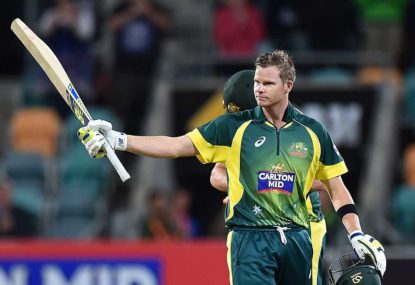If the definition of insanity really is doing the same thing repeatedly and expecting a different result each time, then the Australian selectors have shown that when it comes to Twenty20 strategies and game plans, they’re properly certifiable.
In the five previous edition of the ICC World Twenty 20, Australia has lost the final in 2010 (to England in the Caribbean), finished third in 2007 and 2012, finished eighth of 16 teams in 2014, and 11th of 12 teams in 2009.
And unless there’s a rapid rethink of current selection and strategies for the sixth edition of the WT20 kicking off in March, it’s hard to see how Australia’s consistently inconsistent record in the tournament will improve.
There should be massive alarm bells ringing in the selection room with the way Australia’s bigger hitters have been rendered completely ineffective when the ball is not coming onto the bat. With India hosting the WT20, it’s patently clear that slower and particular spin bowling is going to play a huge role.
More cricket:
» Shane Watson knocks himself into Twenty20 World Cup contention
» Is Shane Watson Australia’s greatest ever captain?
» Australia’s Tour of New Zealand 2016: The battle of the Tasman preview
» Faulkner’s flagging, Watson’s flying
Moreover, India have again proven – if it wasn’t already obvious after six weeks of the Big Bash League – that taking the pace off the ball is still superbly effective on the harder Australian pitches.
The selectors ignored a number of batting options in bringing the squad together for the three matches against India, preferring to pin all hopes on long hitters. Even knowing that India were going to bowl spin for at least 40 per cent of the innings, footwork and subtlety was eschewed for fence-clearing and POW-WER!
The result has been rather predictable. Australia started well in all three games – 1/56 in Adelaide, 0/62 in Melbourne, and 1/57 in Sydney – but as soon as the Ravis, Jadeja and Ashwin, came into the attack, the power game was replaced by leaden feet and poor execution borne out of desperation. When Yuvraj Singh was thrown the ball at the SCG, half the balls the Australian batsmen faced were bowled off just a couple of steps.
You can’t imagine it being much less than 10 overs of spin per game once they get to India.
Even just a token amount of research could see teams playing three and even four spinners against Australia, given the evidence presented in this series. Jadeja and Ashwin took nine wickets between them at 20.5, and Yuvraj chipped in with another couple himself. In total, 11 of the 23 wickets Australia lost in the three games fell to spin.
And this means that the Australian squad for the World T20 can’t be heaving with top-order slappers. Room has to be found for the players capable of pushing the ones and twos in the middle overs with the field spread.
Narrowing the field down to seven batting options was already going to difficult, as I identified last week. In that column, I suggested that five bats – Shaun Marsh, Travis Head, Chris Lynn, George Bailey, and Usman Khawaja – were probably playing for the final two spots behind the evidently certain picks of David Warner, Shane Watson, Steven Smith, and Glenn Maxwell.
I have no doubt Aaron Finch will go to India, with Cricket Australia confirming yesterday his hamstring injury did not require surgery. I’ve raised my doubts over his captaincy before, though, and it was interesting to read yesterday’s injury update specifically mention that along with the WT20 squad being named on February 11, “the captain for the tournament would be announced when the squad was revealed.”
To use Ryan Buckland’s line, that might mean nothing, but I’ll bet it means something.
Now that the series is done, I think I’m leaning toward Bailey and Khawaja winning those final spots, and further, that both probably should slot into the preferred XI.
Watson’s hundred on Sunday night, and his IPL experience and record probably squeezes Marsh out now, in my opinion. Twice Marsh was guilty of poor shot selection and/or execution when his partner was off to a belting start. In Warner, Watson, and Finch – never mind Smith and Khawaja – Australia just doesn’t need another top order bat.
Head will quite likely have a long international career, but this tournament is maybe six months or a year too early for him. Lynn can – and in this series, did – get bogged down by spin, and that will only become more pronounced in India. When the ball’s coming on, Lynn is as destructive a ball-striker as anyone, but that’s just not that likely to be the case on the subcontinent.
And so in putting all this forward, I’m essentially leaning toward a top six of Warner and Watson opening, Khawaja, Maxwell and Smith in the middle, but somewhat interchangeable as the situation needs, and with Bailey at no.6 to close out the innings.
Perhaps if Finch doesn’t get there – he tweeted during the second innings on Sunday night that he’ll be right – that might reopen the door for Marsh, but I don’t think he’d be in the top six, either way.
If nothing else, this series has proved that Australia still has a lot of work to do to be a threat to the Twenty20 format. Sure, shooting oneself in the foot via the selection table for a decade often hasn’t helped, but the penny has to drop that an all-power game is ineffective in those conditions.
For Australia to have any chance at the World Twenty20 next month, it just has to.





























































































